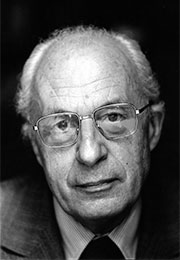Ariès, Philippe

Bio: (1914-1984) French social historian. Philippe Ariès worked outside the academia for most of his life and become a professor only in 1978 at École des hautes études en sciences sociales. In his early writings, he stressed the importance of the historical memory of premodern family life in open households, where public and private lives intertwined, for modern French culture and identity.
In the book Centuries of Childhood Ariès dealt with the history of family and childhood in France and Western Europe in the Middle Ages. With this book, he become the first historian who researched childhood. Using art, personal memoirs, and other written documents Ariès come to the conclusion that in the Middle Ages, the idea and concept of childhood did not exist, and that there was no cultural recognition of childhood, as well as no distinction in social relations toward children. Children before the age of seven had no social significance and after turning seven they immediately started training for adulthood and wearing adult clothing. In the sixteenth and seventeenth centuries, children started to go to schools and universities and then children started wearing distinct children’s and young people’s clothes. Schooling demanded that children be disciplined and go through planned and controlled stages of growth and learning. Children who didn’t follow the school discipline and acted impulsively were viewed as misbehaving and in need of discipline. The propagation of schools created a social environment where children lost their independence and adults started mistrusting their ability to develop on their own, and thus schools invented the psychology of the young. This development introduced disintegration into the whole society.
In the books Western Attitudes towards Death (1974) and The Hour of Our Death (1981, in French 1977) Ariès studied how our relationship to death has changed throughout history. While in pre-modern times death was seen as something familiar and omnipresent, preparation for which come gradually over time, in modern times death started to be seen as a forbidden topic, an enemy to has to be fought and scorned.
Main works
Les Traditions sociales dans les pays de France (1943);
Histoire des populations françaises et leurs attitudes devant la vie depuis le xviiie siécle (1948);
Le Temps de l’histoire (1954);
L’Enfant et la vie familiale sous L’Ancien Régime (1960);
The World of Children (1966);
Western Attitudes towards Death: from the Middle Ages to the Present (1974);
L’Homme devant la mort (1977);
Un Historien du dimanche (1980);
Images de l'homme devant la mort (1983)
Essais de mémoire (1993);
Western Sexuality: Practice and Precept in Past and Present (1985);
Histoire de la vie privée, 5 vols. (1985–1988);
Books translated into English
Centuries of Childhood (1962, in French 1960);
The Hour of Our Death (1981, in French 1977);
Images of Man and Death (1985, in French 1983);
A History of Private Life (1989, in French 1985-1988);

